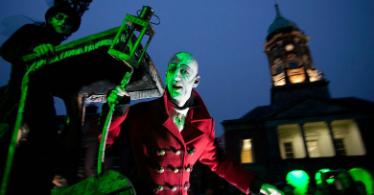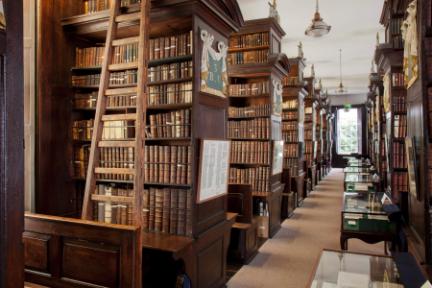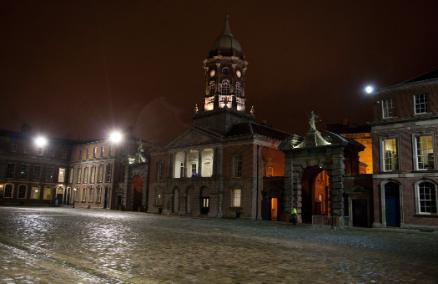Dublin and Bram Stoker the author of Dracula
News
20 October 2021English follows Japanese.
小説『ドラキュラ』の作者のブラム・ストーカーがダブリン出身だということをご存じでしたか?

(ブラム・ストーカー・フェスティバル/Bram Stoker Festival ©Tourism Ireland)
ジャガイモ飢饉真っただ中の1847年、ブラム・ストーカーはダブリンのクロンターフで生まれました。彼は幼少期、病気がちでベッドで過ごすことが多く、その時母親が語って聞かせてくれたアイルランドの民話に親しみました。母親はとりわけ怖い話を好んで聞かせていたようです。
アイルランドの民話には、復讐のために現世へ戻ってきた亡霊の話がたくさんあります。その亡霊は、ゾンビ(アイルランド語で「ニャヴ・メアヴ(neamh-mairbh)」)として知られています。
その中でもっとも有名な話は、「アバター(Abhartach)」と呼ばれる首長の話です。彼は邪悪な男で、皆から嫌われ、恐れられていました。ある時彼が不慮の事故で転落死すると、彼の一族は安心してただちに彼を土に埋葬しました。しかし翌日、一族の手首の傷口からしたたる新鮮な血液を求めて、アバターは再び姿を現したのです。
その後もアバターは命を落としては再び姿を現すので、一族は地元の聖人に助けを求めに行きました。するとその聖人は、亡霊となったアバターを確実に亡き者にする唯一の手段は、イチイの木でできた剣を用いることだと言いました。そこで次にアバターが現れた時、一族はその剣で彼の心臓を刺し、重い石の下に埋葬したところ、彼が姿を現すことは二度とありませんでした。
おそらく、このような話がブラム・ストーカーにこう言わしめたのでしょう。
「恐怖や不安のない人生を送れる人はどんなに恵まれたことか。眠りは夜ごとに訪れ、いい夢だけをもたらす恩恵である。」
ブラム・ストーカーは、ダブリン大学トリニティ・カレッジに進学しました。トリニティ・カレッジには、18世紀に建てられた印象的な建物と石畳の広場があります。彼は在学中、アイルランド最古の公立図書館であるマーシュ図書館で読書に明け暮れました。ここは、小説『ガリバー旅行記』の作者ジョナサン・スウィフトのデスマスクが所蔵されている場所でもあります。

(マーシュ図書館/Marsh Library ©Tourism Ireland)
その後、彼は官吏として、アイルランド史でもっとも重要な建物のひとつであるダブリン城で働きました。この城は、13世紀初期にヴァイキングの定住地跡に建てられ、18世紀にジョージアン様式の宮殿として再建されました。19世紀に入ってからは、ゴシック・リバイバル建築の代表作チャペル・ロイヤルが増築されました。

(ダブリン城/Dublin Castle ©Tourism Ireland)
ゴシック小説作家のシェリダン・レ・ファニュや、名高い俳優のヘンリー・アーヴィングとの出会いなど、この城の周辺での出来事は、小説『ドラキュラ』に反映されていると言われています。
1878年、彼はフローレンス・バルコムとドーソン・ストリートの聖アン教会で結婚。現在そこには、彼の胸像が設置されています。数年後ロンドンに転居し、1897年にはニャヴ・メアヴの話をもとに『ドラキュラ』を執筆しました。
毎年ハロウィーンには、ダブリンで「ブラム・ストーカー・フェスティバル」が開催され、怖さと楽しさの入り混じった数々のイベントを通じて、小説『ドラキュラ』とブラム・ストーカーの功績が称えられています。
Did you know the author of Dracula, Bram Stoker, is from Dublin?
Born in Clontarf, Dublin in 1847, at the height of Ireland’s Great Famine, he was a sickly child who spent many of his early years bedbound. During this time his mother would tell him tales from Irish folklore and apparently she was particularly fond of horror stories.
Irish folklore is full of stories of revenants, people who come back from the dead to seek revenge. They are known as neamh-mairbh, the walking dead.
One of the most famous is the story of a chieftain called Abhartach. He was an evil man, hated and feared by all. When he accidentally fell to his death, his clan were relieved and buried him quickly. Next day Abhartach reappeared demanding blood fresh from cuts on the wrists of his people.
Twice more he was slain and twice more reappeared. Then the people went to the local saint for help and he told them that the only way to kill the undead was with a sword made from the yew tree. When next he reappeared Abhartach was stabbed in the heart and buried again under a heavy stone; he never reappeared.
Perhaps it was stories like this that led Bram Stoker to say: “How blessed are some people, whose lives have no fears, no dreads: to whom sleep is a blessing that comes nightly, and brings nothing but sweet dreams.”
Stoker attended Trinity College, Dublin’s imposing complex of eighteenth-century buildings and cobble-stone squares, and spent much time devouring books at Marsh’s Library, the oldest public library in Ireland and home to the death mask of Gulliver’s Travels author Jonathan Swift.
Later he worked as a clerk at Dublin Castle, one of the most important buildings in Irish history. Erected in the early thirteenth century on the site of a Viking settlement, it was rebuilt in the eighteenth century as a Georgian palace. In the nineteenth century the Chapel Royal was added, a masterpiece of Gothic Revival architecture.
It’s said that the surroundings of the castle inspired elements in the Dracula story as did Stoker’s meetings with Gothic author Sheridan Le Fanu and acclaimed actor Henry Irving.
In 1878, Stoker married Florence Balcombe in St Ann’s Church on Dawson Street where a bust of him now sits. The couple later moved to London and it was there in 1897 that Stoker drew on the tales of the neamh-mairbh to pen Dracula.
Every Halloween Dublin stages the ‘spooktacular’ Bram Stoker Festival which celebrates all things vampire with a mix of fun and spine-tingling events.


